Scarsdale Baseball Club Hosts Baseball Classic
- Details
- Written by: Joanne Wallenstein
- Hits: 7228
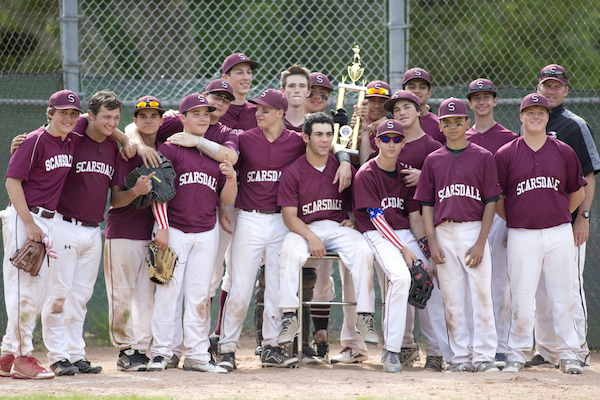 On Memorial Day Weekend, Scarsdale Baseball Club (SBC) hosted its 13th annual Westchester Baseball Classic. This invitational event drew 18 teams from across Westchester to compete in 3 age brackets: 14u, 15u and 16u. Teams came from as far as Ossining and as near as New Rochelle. SBC entered 2 teams in15u and 16u and Scarsdale Little League entered a team in the 14u bracket. In all, over 300 players were involved in the 3-day event.
On Memorial Day Weekend, Scarsdale Baseball Club (SBC) hosted its 13th annual Westchester Baseball Classic. This invitational event drew 18 teams from across Westchester to compete in 3 age brackets: 14u, 15u and 16u. Teams came from as far as Ossining and as near as New Rochelle. SBC entered 2 teams in15u and 16u and Scarsdale Little League entered a team in the 14u bracket. In all, over 300 players were involved in the 3-day event.
For the first time since the inception of the tournament, Scarsdale's 16u team claimed the first place trophy. They came from behind to tie the Elmsford Regulators in the Saturday opener 1-1, and then beat House of Sports 5-3 in Saturday's second game to even their record.
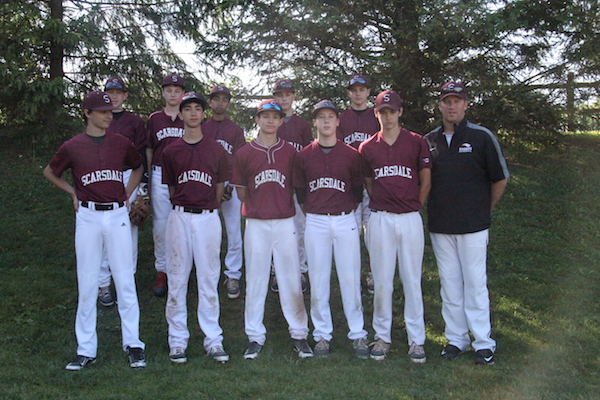 On Sunday the Raiders beat Croton Bombers 4-2. Then the Raiders had to face Elmsford again in the Championship game. This time the Raiders jumped on the Regulators early and were up 6-0 after 2 innings. Sophomore Devin McDonald pitched a scoreless game through four innings. Roy Krishnan came in to relieve and Tyler Mandel can in for the 7th to slam the door on the Regulators as the Raiders held on to win 6-3.
On Sunday the Raiders beat Croton Bombers 4-2. Then the Raiders had to face Elmsford again in the Championship game. This time the Raiders jumped on the Regulators early and were up 6-0 after 2 innings. Sophomore Devin McDonald pitched a scoreless game through four innings. Roy Krishnan came in to relieve and Tyler Mandel can in for the 7th to slam the door on the Regulators as the Raiders held on to win 6-3.
The 14u team played their opening game at Dean Field at Scarsdale High School on Friday night. It was their first time these middle schoolers had the chance to play on the big field and they stepped up to play their best. They battled Tuckahoe Crush into extra innings but came up short in the eighth inning in what may have been one of the most exciting games of the tournament. The mostly 13 year-old squad had a great experience as they went 2-2 against the older teams including a tense 3-1 victory over the NY Mayhem in their final game on Sunday.
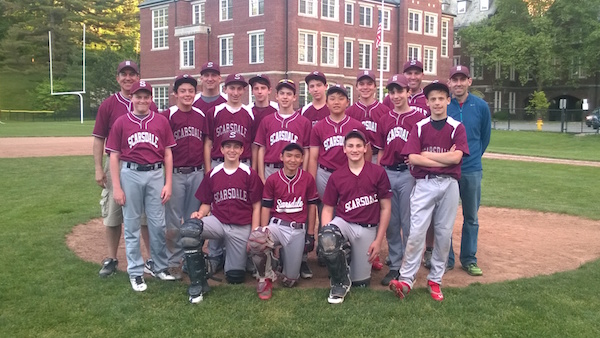
Other bracket winners included:
15u
Champion - Diamond Buddies Hawks
Runner Up - New Rochelle Braves - Blue
14u
Champion - Larchmont/Mamaroneck Wildcats
Runner Up - Westchester Academy
Party!
- Details
- Written by: Joanne Wallenstein
- Hits: 8377
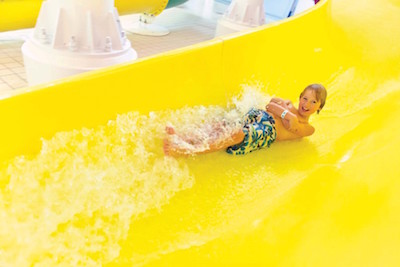 With summer upon us, and birthdays, graduations and celebrations on the calendar, you may have parties to plan. We surveyed friends to come up with ideas for party venues sure to please kids and adults of all ages. Consider these local spots –and if you call – let them know you read about them on Scarsdale10583.
With summer upon us, and birthdays, graduations and celebrations on the calendar, you may have parties to plan. We surveyed friends to come up with ideas for party venues sure to please kids and adults of all ages. Consider these local spots –and if you call – let them know you read about them on Scarsdale10583.
Birthday parties at Chelsea Piers Connecticut are action-packed, entertaining and hassle-free. We help plan the party, provide the space, supervise the activities, serve the food and clean up afterward. Available activities include baseball, basketball, batting cages, GaGa, gymnastics, dance, rock climbing, ice skating, soccer, swimming, tennis, trampolines, water slides, water sports and more. Two-hour party packages are available Fridays, Saturdays and Sundays with limited availability Monday - Thursday. For children's parties, packages include enthusiastic staff and world-class facilities, as well as balloons, paper goods and candles. Packages are also available that include pizza, beverages, invitations, party favors, cake and catering services. Phone - 203.989.1004, Email - parties@chelseapiersct.com or click here.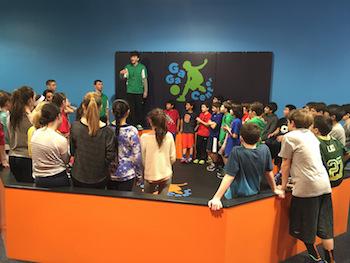 The Gaga Center is located at 365 Central Park Avenue in Scarsdale, New York. With high ceilings, lots of sunshine, three permanent pits and a kicking sound system, the energy is boundless. We offer weekly after school classes, programs for days off from school, Open Gaga on weekends, and birthday parties! We even have a fabulous private party room for all your happy celebrations. And the best part is, we'll take care of it all — from food to paper goods to party favors and everything in between. The Gaga Center, 365 Central Park Avenue Scarsdale, NY 10583, (914) 368 – 9889, www.gagacenter.com.
The Gaga Center is located at 365 Central Park Avenue in Scarsdale, New York. With high ceilings, lots of sunshine, three permanent pits and a kicking sound system, the energy is boundless. We offer weekly after school classes, programs for days off from school, Open Gaga on weekends, and birthday parties! We even have a fabulous private party room for all your happy celebrations. And the best part is, we'll take care of it all — from food to paper goods to party favors and everything in between. The Gaga Center, 365 Central Park Avenue Scarsdale, NY 10583, (914) 368 – 9889, www.gagacenter.com.
The House of Sports is the ultimate birthday party destination! The House of Sports combines a 120,000 square foot state-of-the-art indoor, climate controlled facility with professional, higher energy coaches to provide the best sports themed birthday parties in Westchester County. Located just minutes from Scarsdale, the House of Sports is the ideal location for your sports fanatic's next birthday bash. Visit the House of Sports' website or call 914-479-5419 for more information. Scarsdale Pool: It's easy to host a summer party at the Scarsdale Pool Complex. The staff will set aside an area just for your group and assign a host to help you organize, plan and coordinate the event. They will also conduct games and sports for the guests. Food and beverages are supplied by O'Neill's Concession Stand and the birthday boy or girl will receive a special T-Shirt. To sign up, click here:
Scarsdale Pool: It's easy to host a summer party at the Scarsdale Pool Complex. The staff will set aside an area just for your group and assign a host to help you organize, plan and coordinate the event. They will also conduct games and sports for the guests. Food and beverages are supplied by O'Neill's Concession Stand and the birthday boy or girl will receive a special T-Shirt. To sign up, click here:
Westchester Skating Academy: Experience the COOLEST 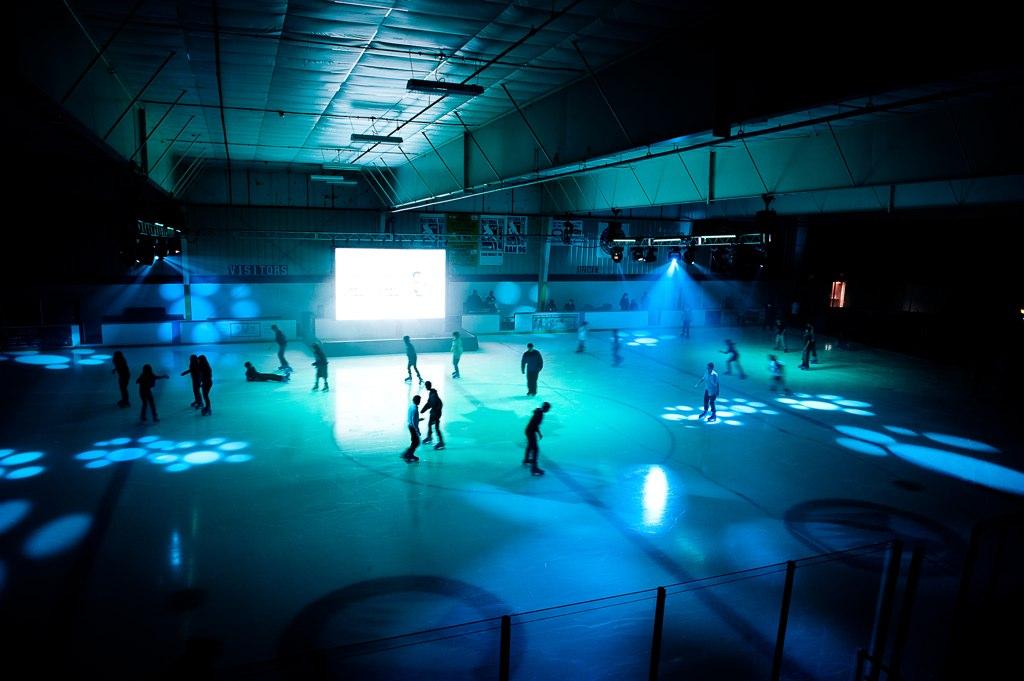 place to have your child's Birthday Party at WESTCHESTER SKATING ACADEMY! We plan your party, provide the space, and supervise all on and off ice activities. Many different packages are available, including Karaoke, Hockey and Frozen. All parties include, admission to public skating, skate rentals, private party room, pizza and choice of beverages. You can even make your own Ice Cream Sundae with unlimited toppings and order custom favors. Many food options are available as well as Kosher. Skating instruction available. We do Parties the right way! Inquire about Private Ice Rental. They are ideal for corporate functions, Bar/Bat Mitzvahs. Sweet 16's and Adult Birthday Parties. 91 Fairview Park Drive, Elmsford, NY 10523, http://www.skatewsa.com/
place to have your child's Birthday Party at WESTCHESTER SKATING ACADEMY! We plan your party, provide the space, and supervise all on and off ice activities. Many different packages are available, including Karaoke, Hockey and Frozen. All parties include, admission to public skating, skate rentals, private party room, pizza and choice of beverages. You can even make your own Ice Cream Sundae with unlimited toppings and order custom favors. Many food options are available as well as Kosher. Skating instruction available. We do Parties the right way! Inquire about Private Ice Rental. They are ideal for corporate functions, Bar/Bat Mitzvahs. Sweet 16's and Adult Birthday Parties. 91 Fairview Park Drive, Elmsford, NY 10523, http://www.skatewsa.com/
Also Keep in Mind:
Bounce U, inflatables: 150 Clearbrook Road, Elmsford, NY, elmsford.ny@bounceu.com, 914-874-5200
Great Play of Scarsdale, Interactive Gym for Kids, 969B Central Park Avenue, Scarsdale, NY 914-713-3470, www.greatplay.com/scarsdale
Imagine Candy, 22 Harwood Court, Scarsdale, www.imaginecandy.com, 914-723-7887
Paint Your Own Pottery, 969 Central Park Avenue, Scarsdale, www.paintyourownpot.com, 914-472-7281
Rockin' Jump, the ultimate trampoline park in Mt. Kisco, 333 North Bedford Road, Mount Kisco, http://mtkrockinjump.com, 914-743,5730
YMCA in White Plains for gym or pool parties, 250 Mamaroneck Avenue, White Plains, 914-949-8030
If you have suggestions for party places, share them in the comments section below.
Scarsdale Middle School Students Create Musical Instruments
- Details
- Hits: 11025
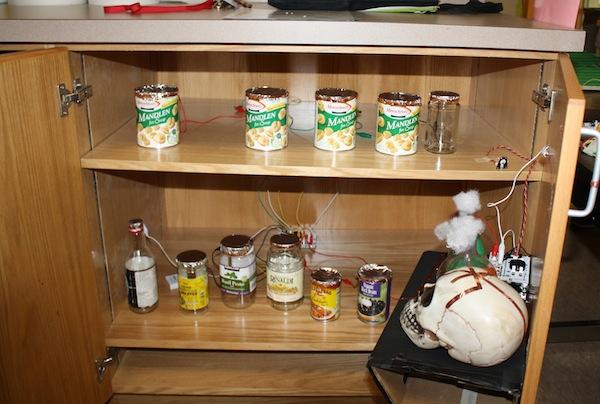 What’s got two doors and is filled with canned food? A musical instrument of course! It sounds strange, but this is just one of the amazing creations that sixth graders in the Exploring Music class at Scarsdale Middle School constructed with the help of the Ototo, and their teacher Dr. Slotwinski.
What’s got two doors and is filled with canned food? A musical instrument of course! It sounds strange, but this is just one of the amazing creations that sixth graders in the Exploring Music class at Scarsdale Middle School constructed with the help of the Ototo, and their teacher Dr. Slotwinski.
Mark McKeague, Joseph Pleass and Yuri Suzuki of Dentaku, based in London, UK, created the Ototo. The Ototo is a small device that emits a sound when its sensors are touched. By hooking up “crocodile clip” wires to the sensors and to some conductive material, you can use your fingers to play musical notes, and eventually full-blown songs. For more info on the Ototo, you can see the Ototo website. 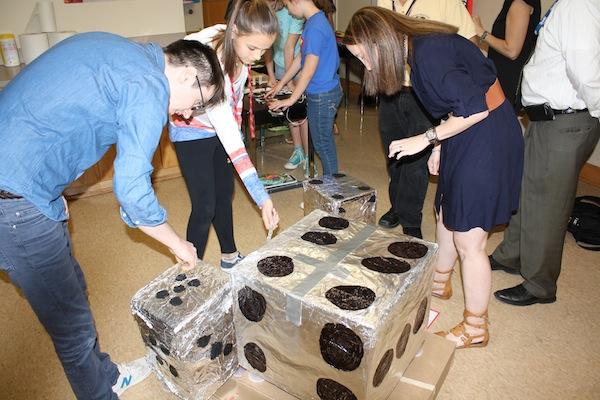
Jessica Slotwinski, who teaches Exploring Music, recognized the creative potential of the Ototo, and applied for a Scarsdale Center for Innovation grant in order to purchase 43 of the devices. Her grant was approved, and she began a 10-week music project with her sixth grade students, to create their own musical instruments. Since the project was so technical, requiring wiring, hot gluing, and woodworking, Dr. Slotwinski enlisted the help of the Technology teachers, Dr. Tuttle and Mr. Rambone, who helped with building the individual projects. Accordingly, whenever technical problems arose, Dr. Slotwinski enlisted help from Computer Teacher Michael Pincus, who had originally helped her with the grant proposal.
The grant itself is a part of the Scarsdale Center for Innovation grant programs, which focus on “research and developmental programs to foster innovative practices." At the center of this program is the “Maker Space” movement, which is based on the idea that the future of the world lies in technology and innovation, two subjects which should be taught in school. While this movement is relatively new, Scarsdale has been utilizing Maker Spaces for several years. Grants like the one used to fund Dr. Slotwinski’s instrument program are being used to supplement the Maker Space programs. This particular grant was funded to create and install “A Music Maker Museum at the Middle School” which should facilitate “a STEAM ecosystem.” STEAM stands for Science, Technology, Engineering, Arts + Design, and Math. STEAM is an extension of STEM (Science, Technology, Engineering and Math) with an added focus on Arts and Design, as exemplified by this program.
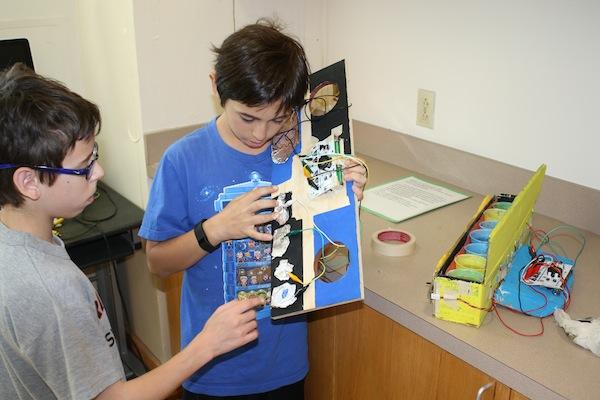 The Project itself was well planned for its maiden voyage as a new addition to the curriculum. There were a few setbacks, as to be expected with new, innovative technical projects, but they proved to be very minor, and did not negatively impact the project over the long term. A couple of these included paint that prevented the signal from traveling through the circuitry and decorations on the musical instruments that interrupted the circuits.
The Project itself was well planned for its maiden voyage as a new addition to the curriculum. There were a few setbacks, as to be expected with new, innovative technical projects, but they proved to be very minor, and did not negatively impact the project over the long term. A couple of these included paint that prevented the signal from traveling through the circuitry and decorations on the musical instruments that interrupted the circuits.
The students met with Dr. Slotwinski every other day, switching off with their gym class, and began by learning about other Ototo instruments through the company’s promotional videos, which can be found here. After understanding the capabilities of the Ototo, the students began to create their own instruments. They individually brainstormed ideas and submitted lists of potential group mates. After careful review, Dr. Slotwinski created pairs and trios of students for the project. The new teams then brainstormed with each other, comparing their own ideas, and creating new ones, before deciding on a final idea to build. Once approved, the groups began to build, going through trial and error troubleshooting to fix any errors and optomize designs.
To end the project, Dr. Slotwinski invited Mark McKeague from Dentaku to the school to view the final projects. Mark flew to New York from London to review the projects, take photos and help students resolve outstanding issues. As a bonus, he asked the students and faculty in attendance to pitch him on their ideas for more Ototo add-ons. Some ideas that came up included a removable speaker attachment to enhance the volume of the device, an inverter for sensors, the addition of even more sounds, the ability to add your own sounds to the device, and a case that can prevent drops or other malfunctions from ruining the Ototo. The project will continue at the school as a part of the Exploring Music Curriculum.
To nobody’s surprise, the instruments came out incredibly well. The dedication of both Dr. Slotwinski and her sixth grade students produced some very interesting and innovative results. Some projects are shown below: The Music Mixer, The House of Music, Musical Chess, B-Ball Madness, The Cardboard Keyboard, DJ Max, and the AT&T. 
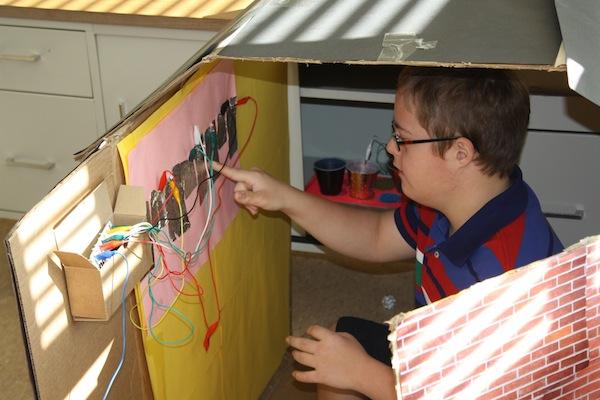
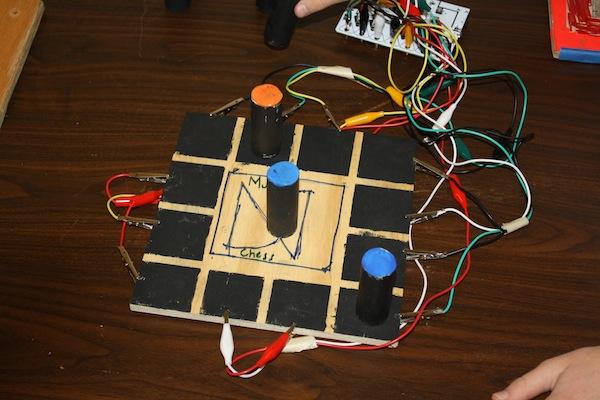
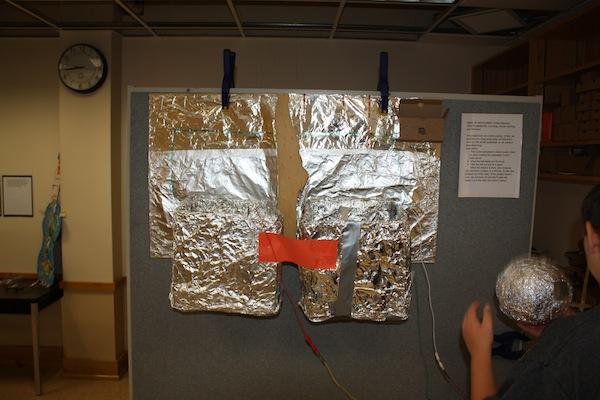
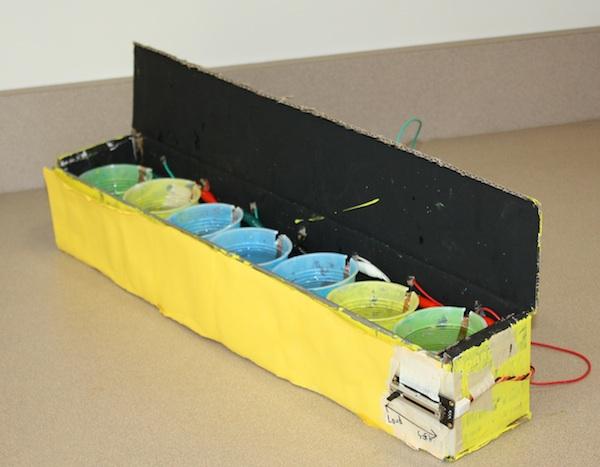
Kids Go Green for Spirit Day at Greenacres
- Details
- Written by: Joanne Wallenstein
- Hits: 5549
 The Greenacres Elementary School community celebrated Spirit Day by dressing in green from head to toe on Friday May 8. They didn't stop there, but also dialed up the green factor by wearing hairpieces, accessories, and anything else that is or could be made green. Students participated in crafts, races and contests, all organized by the PTA.
The Greenacres Elementary School community celebrated Spirit Day by dressing in green from head to toe on Friday May 8. They didn't stop there, but also dialed up the green factor by wearing hairpieces, accessories, and anything else that is or could be made green. Students participated in crafts, races and contests, all organized by the PTA.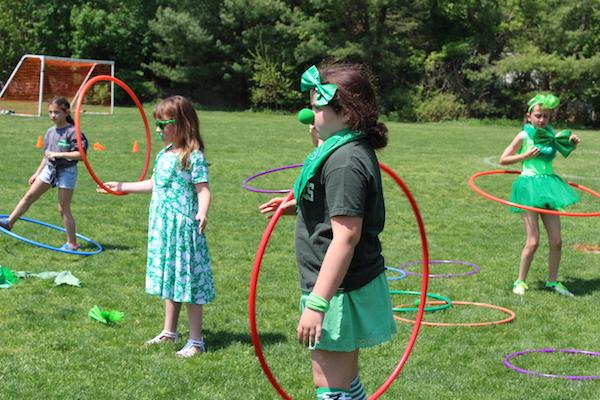
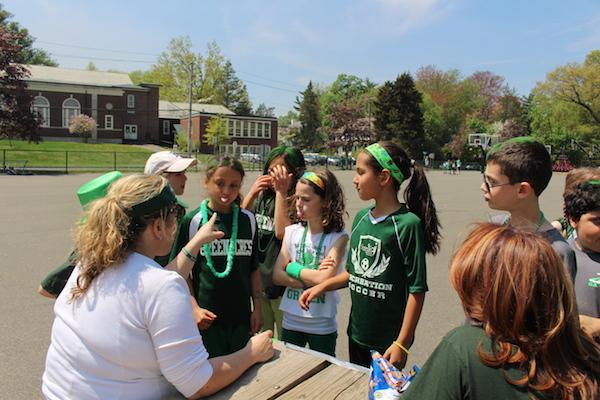
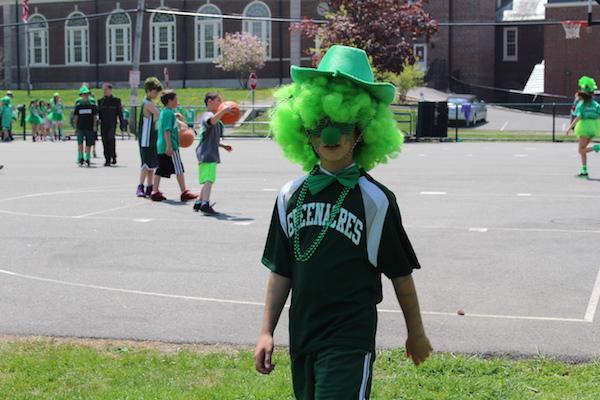

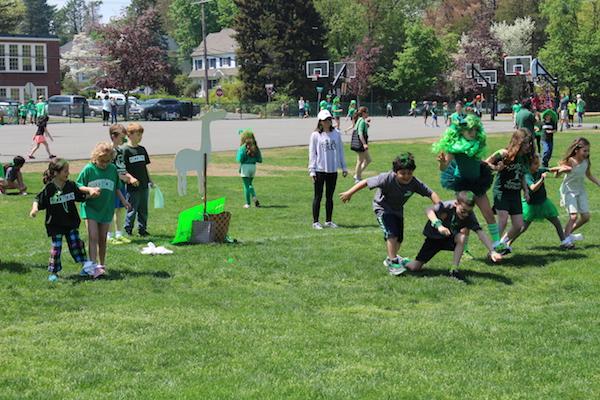
Teenage Drinking - Ban It or Tolerate It?
- Details
- Written by: Joanne Wallenstein
- Hits: 7425
 "For every prohibition you create, you also create an underground" --Jello Biafra, Dead Kennedys
"For every prohibition you create, you also create an underground" --Jello Biafra, Dead Kennedys
Our teenagers are growing up in a culture of alcohol consumption. With the legal drinking age of 21, binge drinking prior to going out for the night has become the norm, in my town beginning as early as in ninth grade. As one who dislikes both the taste of alcohol and the loss of control associated with inebriation, I personally have difficulty understanding this teen obsession; I suspect it is a combination of wanting to fit in with one's peers, rebellion and incomplete myelination of the evolving brain. While certainly not all teenagers consume alcohol, a great number of parents whose mantra is "not my child" are nothing short of delusional; a recent study reports that 86% of our youth admit to trying alcohol prior to age 21.
I allow – no, I tolerate my teenage children's alcohol consumption. While I make it clear to them that I am not condoning their drinking and that it is, in fact, illegal outside of our home, I have made a "one drink" deal with them; they can have one alcoholic beverage as long as they are not driving. This contract also includes a discussion of the myriad risks associated with drinking, and the statement that I prefer they opt out.
I suggest to them the alternative of drinking non-alcoholic beverages out of the ever-popular, alcohol-indicative red plastic solo cup, (mis)leading other teens to assume that alcohol is contained within. Having once (long, long ago) been a teenager myself, I understand the potentially overwhelming peer pressure experienced by a group whose main objective is often to conform. Truly, one would hope that our children have the inner strength to resist negative peer group influences, but let us not deceive ourselves – clearly that is frequently not the situation, as our town ambulances make regular excursions to the emergency room to deliver dangerously impaired high schoolers. My community is not alone in its transgressions; studies report that nearly 200,000 underage drinkers are seen in emergency rooms across the United States each year.
Has my approach been a success? I attended a tenth grade parent meeting, organized by the local high school and moderated by a trained counselor. I was clearly the exception surrounded by a majority who espoused that we must maintain zero tolerance for alcohol use by our children. With my one-drink approach, I have been able to maintain open lines of communication with my own tenth grader by reaching this agreed upon compromise. She feels comfortable confiding in me both her actions and those of her counterparts; as such, I knew which parent group members had offspring who drank regularly, while they vehemently disagreed with me and staunchly declared that prohibition was the only option.
I did not pay a return visit to that circle, and yes, I feel confident that mine was and is an infinitely more effective approach. It is said that "knowledge is power," and safety is of paramount importance – my children do not hide their activities, legal or illegal, from me, leaving me poised to help them, if need be.
Alcohol was not presented as the "holy grail" in our home. When adults had a glass (or in my case, a taste) of wine, our children were allowed as well. Our hope was that we could demystify alcohol, and when our daughters and son went to college, they would be less likely to become uncontrollably immersed in the pervasive drinking culture. I believe we have succeeded; our children are emerging from their teen years relatively unscathed, in contrast to several of their friends. Not long ago, I received a 1 a.m. phone call from my then 17-year-old college freshman daughter who accompanied her unconscious friend and EMS to the emergency room after this friend, out with others indulged/overindulged in alcohol for the first time. It became incumbent upon my terrified, (sober) daughter not only to call 911, but also to telephone her friend's parents and ask them to travel to the hospital to make necessary medical decisions for their daughter. I was later told that my child's friend's parents were of the zero tolerance belief, and they were ultimately told their daughter unknowingly consumed alcohol when her drink was spiked. The deficiency in honest family communication was perpetuated.
Is my way the only way? I do not believe so – each young adult and each family dynamic is different, and what works for one cannot necessarily be generalized. I am, however, confident that one must take a frank, unbiased look at one's children, with whom it is imperative we have meaningful, direct and ongoing dialogue. As parents, we need to look at the greater framework in which our youth exist and understand the roles that immaturity and peer pressure may play.
Statistics support that the "not my child" view is disproportionately incorrect – when it comes to teenage drinking, it is much more likely to be your child than not. It is my opinion that this self-delusional perspective, in combination with an inflexible zero tolerance policy, prevents candid discourse and may endanger one's child. And so, I defend my choice to sit with my children as we all enjoy a glass (or sip) of wine.
this article originally appeared on the parenting blog, Grown and Flown.






